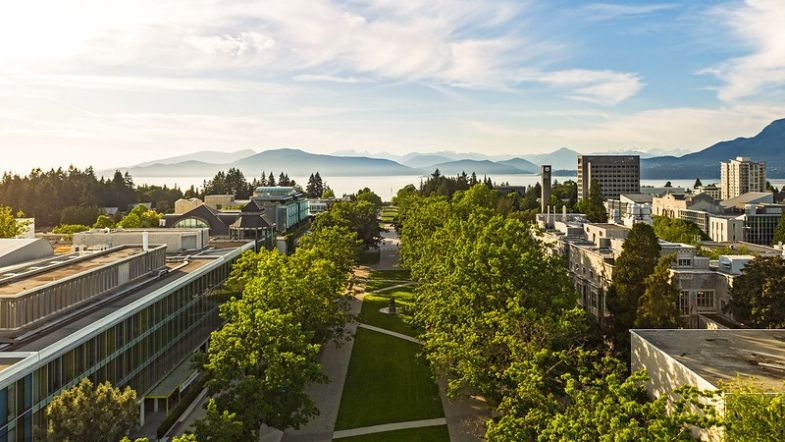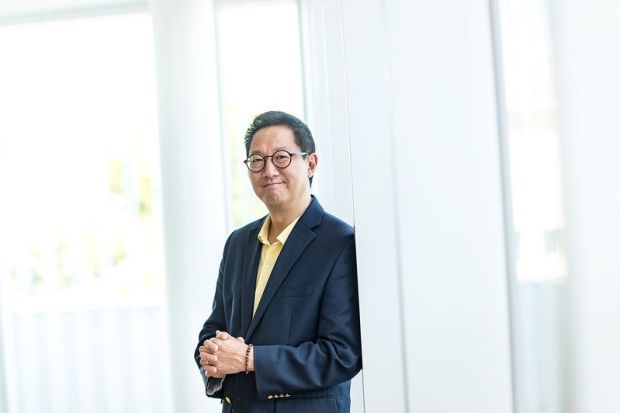Seven years ago, when Santa Ono was president of the University of Cincinnati, a student took his own life. Ono was prompted to “come out” as a fellow sufferer of mental health issues and shocked the community by describing his own two attempts at suicide.
Now, as the president and vice-chancellor of the University of British Columbia (UBC), he has made mental health a principal concern. In the 11th in our Talking Leadership series, Ono discusses the structural causes of poor mental health within higher education, criticises the universities that don’t collect data on sexual assault on campus, and says that some people are better off not discussing their mental health struggles.
Improving mental health provision
When he first became president at UBC, Ono – who comes across as a kindly uncle you wouldn’t want to disappoint – doubled the budget for mental health provision.
He appointed a chief student health officer, a person who had previously worked at Canada’s Centers for Disease Control and Prevention, to have oversight of all aspects of student emotional and physical well-being. Their goal is “to advocate on behalf of the students, to really put herself in their shoes and to see what it’s like to need mental health support”, Ono says.
Identifying that the traditional model of counselling provision – housed in the student services building or the local hospital and open weekdays nine to five – wasn’t working because “often students need support at 2am on a Saturday or Sunday”, they installed trained councillors to live within student accommodation.
“They can actually detect changes in the demeanour of the students, things such as whether they’re waking up, going to class, going to meals on time,” says Ono. “It’s a sort of early alert system within the halls of residence so that we could provide mental health support 24/7.”
Data collection
Top of his list of tactics to improve mental health is data collection. This is vital for refining both mental health services and for tackling one of the more insidious causes of mental health struggles at university: sexual assault.
Ono is scathing about the institutions that are failing to collect data on sexual assault.
“In many universities, the mechanisms to collect data are not sufficient. In some cases, the systems are broken. In some cases, the data are not even being collected.”
A look of anguish crosses his face when he explains that some believe that data showing use of the services going up looks bad for the university.
“That’s really misplaced,” he says. “We want to identify those situations, and we want to support those individuals. And we want to identify those perpetrators, and we don’t want them in our university.”
UBC’s sexual assault policies evolved over several years, Ono says, and are regularly refined based on surveys. “It’s not always a pretty picture,” he says.
“In these very traumatic situations we are mindful of the harm that an institution can create by not interacting with the victim in a sensitive and empathetic way,” he adds.

Structural problems
In a powerful TedX talk filmed in 2017 and now viewed tens of thousands of times, Ono outlines why he tried to kill himself at 14.
With a father who was a maths professor and two talented brothers, “here I was this pretty ordinary guy flanked by two amazing child prodigies. And I felt totally inadequate and someone who wasn’t really fitting to be a member of this august family.
“I think my parents were pretty ashamed of me,” he says.
His second attempt was in his late 20s when he was an assistant professor at Johns Hopkins University; he was then diagnosed with bipolar disorder and treated with medication and psychotherapy.
“Over a period of years, unbeknownst to my chairman, the dean, the president of Johns Hopkins, I worked to try to tackle the demons inside of me.”
With both his suicide attempts linked to academic pressure, does he think there is something inherent to education, something structural even, that needs to change?
When it comes to students, he thinks not. Universities take in students during a “a period of tremendous transition”, when their first experiences of failure collide with distance from their usual support networks.
But what of academics? Those on the cusp of a professorial career (as Ono was), desperate to build steady foundations for their careers, are known to suffer from poor mental health. Can something be done about the ever-present pressure seething under the surface of a life in academia?
At UBC, there is a programme called Thrive, Ono says, which aims to counter this by providing socialising opportunities for academics. But is it possible this type of programme may just add another item to the to-do list, along with the endless requirements to publish papers, win grants, secure contracts and teach? Isn’t work-life balance the issue that must be solved?
Indeed, Ono has attributed his own steady well-being in part to an improvement in this area.
“It's very difficult” to tackle this particular demon, he concedes. As president, all he can do is try to set a tone.
“What happens in the life of a young faculty member is usually occurring within a unit or a department within a faculty or college…these sorts of changes [for the better] occur incrementally and they occur episodically and in certain departments and not others,” he says. “But the most important thing for a vice-chancellor is just to talk about it.”
Ono says he also found equilibrium in his own mental health via self-acceptance.
“I came to terms with my feeling of inadequacy. Comparing myself to, you know, people that are exceptional in different things, I came to terms with realising that I have other strings, I have other abilities.”
One pitfall universities frequently fall into is not recognising the value of all their staff. It takes all sorts to keep university life flowing, Ono says, but many go unrecognised.
“It doesn’t work if you only celebrate the Nobel-class scientist without recognising the great teacher, and without recognising those who serve the institution…That can be the root cause of a lot of stress and challenges for academic staff.”
Since his own revelations, discussion of mental health has become more mainstream, but there are still some who perceive it as a weakness. For those, Ono has “very little patience”.
But they may be the very people his students go on to be employed by. Does he worry his students could be penalised by their future bosses for being honest about mental health?
The short answer is yes. “If you’re early in your career, it is risky. It is not easy to talk about your challenges, I wouldn’t even recommend it,” he says. “You have to be careful. And you have to think about who you will reach out to.”
Quick facts
Born: Vancouver, 1962
Academic qualifications: BA in biological sciences from the University of Chicago; PhD in experimental medicine from McGill University
Lives with: His wife, younger daughter and dog. His older daughter is at university.
Academic hero: As a researcher, Rosalind Franklin. As an administrator, Sir Malcolm Grant, president of UCL when Ono worked there.
This is part of our “Talking leadership” series of 50 interviews over 50 weeks with the people running the world’s top universities about how they solve common strategic issues and implement change. Follow the series here.
If you’re having suicidal thoughts or feel you need to talk to someone, a free helpline is available round the clock in the UK on 116123 or you can email jo@samaritans.org. In the US, the National Suicide Prevention Lifeline is 1-800-273-8255. In Australia, the crisis support service Lifeline is 13 11 14. Other international suicide helplines can be found at www.befrienders.org.





